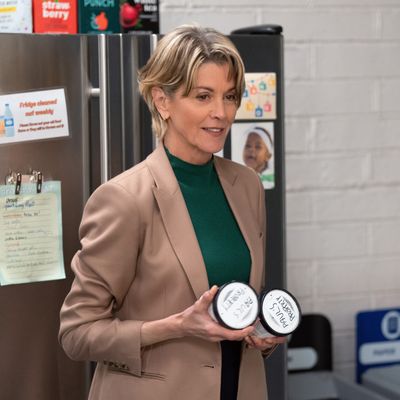
When Liz tells Gaby that she wants to become a better, more selfless person, Gaby invokes psychological egoism, the theory that all human behavior is motivated by self-interest. If you want to be good to other people, you need to want to — if you don’t derive some joy from selflessness, it’s impossible to sustain.
Liz knows that she does derive joy from making other people happy, so she doesn’t think too hard about how Sean might realistically react to the news that she sold her share in their food truck business to his dad. In her mind, Sean and his dad always talked about starting something like this together, so she’s robbing them of that opportunity by sticking around. But it’s so clearly the wrong move.
Last week, Sean shot down a proposed profile about his time in the military because this partnership with Liz was supposed to represent a step forward for him, a fresh start without the baggage of the past. It seemed like she understood that. But now she’s forcing him into a partnership with somebody he has purposely avoided for months — somebody with whom his relationship is, at best, extremely complicated. Liz has made plenty of well-meaning errors on this show, so it’s not exactly unbelievable she’d do something like this. But it’s disappointing, especially if it means less screen time for the two of them going forward (though I’m sure they’ll heal their relationship before long).
There is a slight contrived feeling to some of the character drama in “Psychological Something-ism,” including the ending moment with Alice hooking up with her best friend’s new guy, the person she knows will give her attention and distract her from what she’s feeling. I figured something like this would happen from the moment she introduced Connor to Summer, and it’s painful to watch. (When Connor appeared, I immediately said, “Oh no.”)
Again, that’s not to say Alice’s actions are unbelievable, especially for a messy teenager who just confronted the man whose drunk driving killed her mother. She promised Paul she wouldn’t follow Louis (a.k.a. Double D) again, but she goes a step further and makes contact with him at the coffee shop where he works. Louis has actually wanted to speak with her, which we basically knew from his appearance at Jimmy’s office. But she’s repulsed by his empathetic words, and his awkward fumbles at an apology that can never really make up for what he did.
Perhaps Alice is so angry and sad because even that short interaction with Louis shifted her way of thinking about him a bit. He’s not some evil or indifferent man who wants to avoid acknowledging what he did. He’s a human being who’s hurting. It’s not hard to understand why that idea would sicken Alice; how can this man’s pain even begin to equal the depth of her and her dad’s? They’re the ones who lost someone here, whose lives were flipped upside down. It’s hard to accept that the person you’ve spent all this time hating — the easy and justifiable target for all your blame and all your rage — might hate himself even more.
For now, Jimmy has managed to successfully bottle up these same speculations, distracted by his return to Jimmying. Psychological egoism is at play here, too, with Jimmy’s extreme emotional investment in getting Grace help. It’s a selfless goal, but he also gains something personal from it, some absolution for his own role in what happened to her. (The fact that Grace’s actions almost got Donny killed is a lesser concern, being that the guy sucks so bad.)
Donny doesn’t drop the charges against Grace, but the glowing witness statements and allegations of abuse stop the state from pursuing them. The problem is that Grace doesn’t believe she should be forgiven. Moving to Vancouver with her sister Jennie is an appealing idea, but she doesn’t think she deserves that comfort. She must be punished, even if that means going back to Donny and taking care of him on his long road to recovery.
Jimmy and Brian’s journey to get Grace’s groove back allows them time to hash out some issues in their friendship, specifically Brian’s anger that Jimmy didn’t tell him about sleeping with Gaby. It’s a cute enough story, especially Jimmy’s ending gesture of dropping in to get to know Brian’s husband Charlie better over dinner. But I’m also not sure it works as best as it should. For one, we never really get a sense of why Jimmy didn’t tell Brian about Gaby; season one showed that Brian’s relentless positivity could be stifling when Jimmy was still in the throes of grief, but there isn’t an equivalent motivation here.
Their big argument also balances the scales a little too evenly, with Brian betraying his ignorance about some huge chunks of Jimmy’s life. Not knowing he’s Alice’s godfather, and not even knowing her approximate age? Come on, Brian! And then he slaps Jimmy? (To be fair, Jimmy is very slappable.) There’s something really interesting about Brian’s fear that he and Jimmy wouldn’t be friends if they met today, but the episode doesn’t actually do much with that idea.
Brian finally manages to change Grace’s mind by showing her the witness statements and letting Jennie read her own, reminding her sister that she’s more than her worst mistakes. And so seconds later, we’re watching the two women drive off into the sunset in a U-Haul. If this is Heidi Gardner’s exit from the show, it’s a sappy but decent enough ending.
Everyone in Shrinking is working on themselves, trying to become more selfless but often self-sabotaging in the process. That’s often true of Jimmy, and it’s definitely true of Liz right now. But it’s also true of Paul, who thinks he’s doing the right thing by telling Julie he doesn’t want to put her through the same experience she had with Elliot. It’s true that Julie really struggled watching dementia slowly erode the husband she loved. But Parkinson’s isn’t the same, and besides, Paul isn’t nearly at a point where he’s losing himself. Most importantly, Julie is a grown woman who can make her own decisions about what she wants to take on. There’s no need for Paul’s annoying gallantry.
Still, you see where he’s coming from, and it’s always a delight to see Harrison Ford in a rare vulnerable mode. Paul is downright awkward and uncomfortable when he first meets Elliot, and he’s reluctant to open up to Derek, whom he meets for the first time. Ford and Ted McGinley make for a natural comedic duo, with Derek’s uncomplicated sweetness and lax attitude helping show Paul the necessity of protecting the love in his life. It must hurt Paul to admit it, but he and Liz do have a lot in common. In this episode, they’re both offering to dissolve a partnership out of some misplaced sense of heroism.
Meeting a new neurologist is necessary for professional boundaries, but it’s also a way of compromising with Julie: Paul isn’t going anywhere, but his girlfriend also doesn’t need to play such a direct role in his treatment. This works better for everyone. Maybe that’s what selflessness is all about: having empathy and looking out for other people without centering yourself as some martyr. Helping people, whether strangers or your friends and family, needn’t be a sacrifice.
Progress Notes
• Gaby is still drawing a strict boundary with Jimmy, and that includes banning him from group hangs with Liz and Derek. Sorry, Jimmy!
• “A lot of f-bombs.” “Well, it’s not to my congresswoman. It’s to the guy who killed my mom.”
• “Are you going to visit his grave, or … ?” “No, Jimmy. Not everyone’s spouse is dead.”
• “My mom’s making me crash at home tonight. She’s pissed because she thinks I took her Vicodin. Which I did, but not to use it. Just to sell it.”
• I’m glad the episode doesn’t dwell too much on Paul neglecting to ask about Gaby’s teaching. He asks her later on, and all is forgiven.
• Nice to see Jury Duty’s Edy Modica getting more work! Here she appears as Jackie, Gaby’s patient who stopped taking her postpartum medication.
• “I hope he doesn’t get better.” “I hear you. I still feel like that’s wildly inappropriate.” This was maybe the funniest moment of the episode for me. But also, Jimmy, you’d know a lot about inappropriate dynamics with your patients, wouldn’t you?
• Speaking of inappropriate dynamics, imagine your therapist and your attorney reacting together the way Jimmy and Brian do when they learn about the dropped charges.
• I might be forgetting from season one, but it’s news to me that Brian was closer with Tia than Jimmy toward the end. Would definitely be curious about what that friendship looked like, since we’ve seen so much of Tia’s relationships with Jimmy, Alice, and Gaby.


